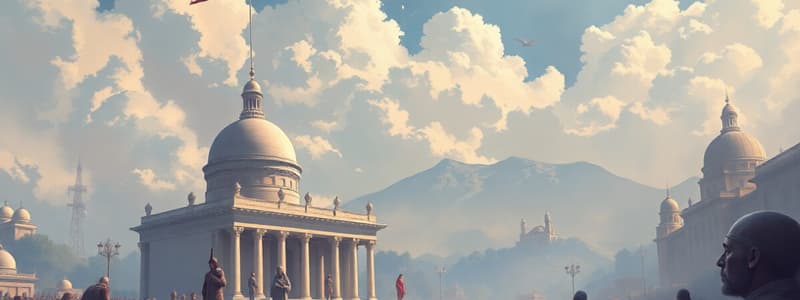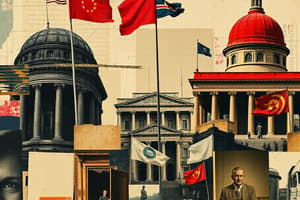Podcast
Questions and Answers
Which type of polity is characterized by rule by a small group of individuals or families?
Which type of polity is characterized by rule by a small group of individuals or families?
- Autocracy
- Democracy
- Monarchy
- Oligarchy (correct)
What is the main function of governance within a polity?
What is the main function of governance within a polity?
- Establishing public policies (correct)
- Distributing resources equally
- Conducting elections
- Organizing political culture
Which of the following best describes 'sovereignty'?
Which of the following best describes 'sovereignty'?
- The process of resource allocation
- A state’s authority to govern itself (correct)
- The influence of economic policies on politics
- The right to vote in a democracy
Public participation in political processes includes which of the following?
Public participation in political processes includes which of the following?
What is the theory that suggests that governments are formed based on an implicit agreement between the ruled and rulers?
What is the theory that suggests that governments are formed based on an implicit agreement between the ruled and rulers?
Which of the following elements is NOT a component of polity?
Which of the following elements is NOT a component of polity?
Which concept describes the acceptance by the governed of the rightful authority of their government?
Which concept describes the acceptance by the governed of the rightful authority of their government?
Globalization influences polities in what primary way?
Globalization influences polities in what primary way?
Flashcards are hidden until you start studying
Study Notes
Definition
- Polity refers to a form or process of civil government or constitution.
- Represents the organization or structure of a society and the political dynamics within it.
Key Concepts
-
Types of Polities
- Democracy: Rule by the people, either directly or through elected representatives.
- Monarchy: Rule by a king or queen; can be absolute or constitutional.
- Oligarchy: Rule by a small group of individuals or families.
- Theocracy: Rule by religious leaders or based on religious laws.
- Autocracy: Rule by a single entity with absolute power.
-
Elements of Polity
- Political Institutions: Organizations that create, enforce, and apply laws (e.g., legislature, judiciary, executive).
- Political Culture: Set of attitudes, beliefs, and sentiments that shape the behavior of citizens and their interaction with the government.
- Public Participation: The involvement of citizens in political processes, including voting and civic engagement.
-
Functions of Polity
- Lawmaking: Creating rules and regulations governing society.
- Conflict Resolution: Settling disputes among individuals and entities.
- Resource Distribution: Allocating resources and services based on policy decisions.
- Governance: Establishing and managing public policies.
Theories of Polity
- Social Contract Theory: The idea that governments are formed based on an implicit agreement between the ruled and their rulers.
- Pluralism: A theory suggesting that multiple groups compete and influence policy, reflecting diverse interests in society.
- Elitism: The view that a small elite group holds significant power over the political process, often overshadowing average citizen influence.
Relationships with Other Concepts
- Polity and Economy: Interaction between governmental policies and economic practices can impact development and social welfare.
- Polity and Society: Cultural norms and values significantly influence political behavior and government structure.
Important Terms
- Sovereignty: The authority of a state to govern itself without external interference.
- Citizenship: Membership in a political community, often entailing rights and responsibilities.
- Political Legitimacy: Acceptance by the governed of the rightful authority of their government.
Modern Challenges
- Globalization: Influences how polities interact across national boundaries.
- Political Polarization: Increasing ideological divides within societies leading to challenges in governance.
- Environmental Policy: Growing need for polities to address climate change and sustainability.
Conclusion
Understanding polity is crucial for comprehending how societies are organized, governed, and how citizens interact with their governments.
Polity: Structures and Dynamics
- Polity refers to the organization and structure of a society, including its political system and dynamics. It encompasses how a society is governed and how its citizens interact with power structures.
Types of Polities
- Democracy: Power resides with the people, exercised directly or through elected representatives.
- Monarchy: Ruled by a king or queen, with varying levels of power (absolute or constitutional).
- Oligarchy: Rule by a small, select group of individuals or families.
- Theocracy: Government based on religious laws and led by religious figures.
- Autocracy: Rule by a single individual with absolute authority, often dictatorial.
Elements of Polity
- Political Institutions: Organizations responsible for creating, enforcing, and applying laws (e.g., legislature, judiciary, executive).
- Political Culture: A collective set of beliefs, attitudes, and sentiments that shape citizens' political behavior and their relationship with the government.
- Public Participation: Citizens' involvement in political processes through voting, activism, and civic engagement.
Functions of Polity
- Lawmaking: Establishing rules and regulations that govern society.
- Conflict Resolution: Resolving disputes between individuals and entities, ensuring stability and fairness.
- Resource Distribution: Allocating resources and services based on policy decisions, influencing economic and social development.
- Governance: Establishing and managing public policies to address societal needs and priorities.
Theories of Polity
- Social Contract Theory: Governments are formed through an implicit agreement between the ruled and their rulers, based on principles of mutual consent and shared responsibility.
- Pluralism: Multiple groups with diverse interests compete and influence policymaking, fostering a balance of power and representation.
- Elitism: A small, elite group holds significant power and influence over the political process, potentially overshadowing citizen participation and representation.
Polity in Context
- Polity and Economy: Government policies and regulations interact with economic practices, affecting growth, development, and social welfare.
- Polity and Society: Cultural norms, values, and beliefs shape political behavior, government structure, and the relationship between citizens and the state.
Key Terms
- Sovereignty: The supreme authority of a state to govern itself without external interference.
- Citizenship: Membership in a political community, often including rights and responsibilities.
- Political Legitimacy: The public's acceptance of a government's authority and right to rule.
Modern Challenges
- Globalization: The interconnectedness of societies across national boundaries influences political dynamics and presents challenges in governance and policymaking.
- Political Polarization: Increasing ideological divides within societies can lead to gridlock, instability, and challenges in achieving consensus on policy issues.
- Environmental Policy: Societies face the urgent need for governments to address climate change and sustainability concerns, requiring effective and collaborative policy responses.
Studying That Suits You
Use AI to generate personalized quizzes and flashcards to suit your learning preferences.




